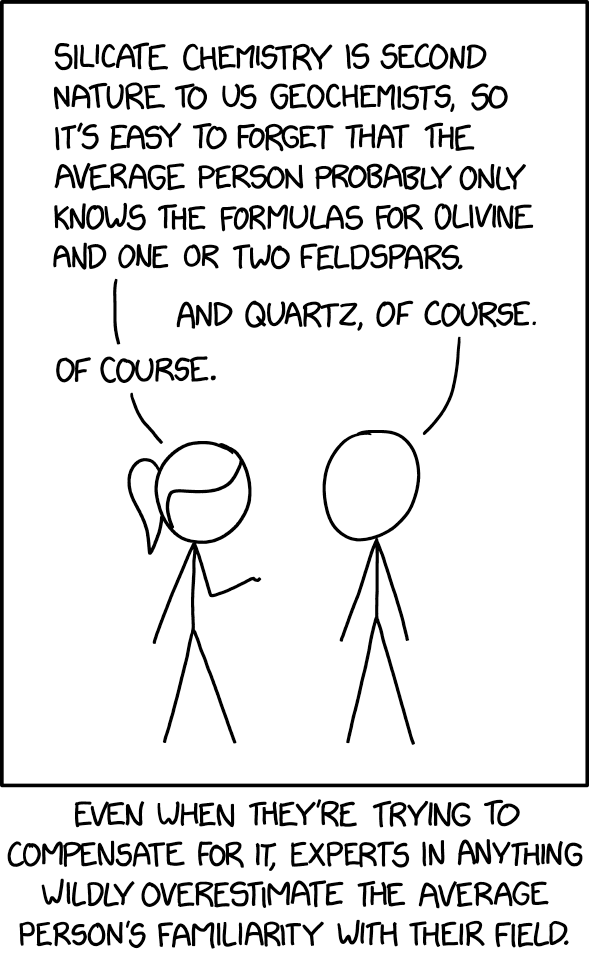The Curse of Knowledge: How Knowing Too Much Can Hinder Clear Academic Writing

Why do we, as scholars, write? In the simplest terms, it is to communicate our ideas and knowledge to others. But sometimes knowing too much gets in the way of clear communication. This phenomenon is called the curse of knowledge––the difficulty of imagining that other people don't know what you already know.
This article is the first in a series exploring the curse of knowledge in academic writing. Future installments will examine common issues that hinder communication, such as the use of jargon, abbreviations, and foreign language terms, and offer strategies to help scholars overcome the curse and convey what they know more clearly.
If you're reading this, you're likely a scholar. You're an expert in your field; to put it bluntly, you know a lot of things that average people, and even many of your equally specialized colleagues, don't. After all, sharing research findings––that is, the new knowledge you have produced––in scholarly papers and monographs is a key ingredient in the glue binding the academic community together.
"Bad" Writing and Why It Happens
Now, I'm also sure you spend considerable hours reading what others have written. You're a smart person, an expert in your field. But despite your expertise, you certainly come across papers whose topics may intrigue you yet lack something you can't put your finger on. You might feel a bit confused, perhaps even lost in places; maybe you think the writing is just "bad."
It's not the research that's at fault, however; it's the way the author is communicating it. You see, they may be so immersed in their subject that they've forgotten what it's like to not know what they do know––a classic example of the curse of knowledge.
The Curse of Knowledge in Academic Writing
The concept of the curse of knowledge was originally developed in 1989 by economists studying bargaining scenarios.
Since then, it has been applied in other fields of knowledge, most importantly for academic writers by cognitive psychologist and psycholinguist Steven Pinker in his wonderful book The Sense of Style: The Thinking Person's Guide to Writing in the 21st Century.
You know that "bad" writing you've encountered in academic journals? Pinker has a clear answer to where it comes from: "The main cause of incomprehensible prose is the difficulty of imagining what it's like for someone else not to know something that you know."[1]
The curse of knowledge may take many shapes in academic writing: the overuse of foreign languages, abbreviations, or jargon, or as Helen Sword calls it "jargonitis."[2] That's not to say there isn't a place for these things in scholarly communication. But writers suffering from the curse of knowledge all make one crucial mistake; they assume their readers know what all these terms mean without checking if that's the case or offering any explanations. In this series, we'll be exploring some of the ways in which the curse appears and ways to break it.
This XKCD cartoon, "Average Familiarity," perfectly encapsulates the problem:
Why It Matters
Recall that writing is an act of communication. When you put ink to paper, or today, fingers to keyboard, your main goal should be to communicate with your readers, and, ideally, enter into an ongoing academic conversation, not just to boast about what you know or show off your great writing skills. Of course, there's nothing intrinsically wrong with demonstrating expertise or skill, but it should serve the communication, not overshadow it.
To paraphrase Pinker, neglecting your readers, their perspectives, and what they know is the best explanation for why otherwise brilliant scholars write miserable prose. Bad writing can limit the reach and impact of your research. For example, one study found that the more specialized terms a paper includes, the less likely it is to be cited by other authors. Recognizing and addressing the curse of knowledge, therefore, will not only make your writing clearer but can also expand the reach of your work and lead to greater career success.
Breaking the Curse of Knowledge
So, how can you lift the curse? The common advice is to keep the reader in mind as you write. Pinker notes that while this is a good start, it may not be as effective as we think. He emphasizes: "your readers know a lot less about your subject than you think they do, and unless you keep track of what you know that they don't, you are guaranteed to confuse them."[3]
Pinker shares the following practical recommendations for authors:
Be mindful of jargon, abbreviations, foreign languages, and technical terms. These have a role in scholarly writing and shouldn't be completely avoided, but use them judiciously.
When you do use unfamiliar terms, explain them. A brief explanation won't bore most readers, and it greatly increases comprehension for those who are less familiar with the topic.
Favor recognizable and memorable technical terms when you must use them.
In the upcoming series of articles, I'll explore these recommendations in greater detail, showing how to apply them to make your writing clearer, more engaging, and more widely accessible.
Are you concerned you might be suffering from the curse of knowledge? I can show you how to break the curse and communicate more effectively. Get in touch to see how I can help.
[1] Steven Pinker, The Sense of Style (Penguin, 2014), 57.
[2] Helen Sword, Stylish Academic Writing (Harvard University Press, 2012), 112.
[3] Pinker, 63.
